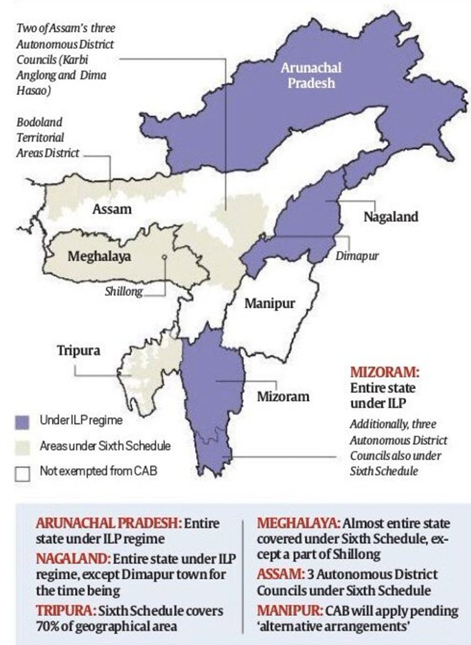- Courses
- GS Full Course 1 Year
- GS Full Course 2 Year
- GS Full Course 3 Year
- GS Full Course Till Selection
- Answer Alpha: Mains 2025 Mentorship
- MEP (Mains Enrichment Programme) Data, Facts
- Essay Target – 150+ Marks
- Online Program
- GS Recorded Course
- Polity
- Geography
- Economy
- Ancient, Medieval and Art & Culture AMAC
- Modern India, Post Independence & World History
- Environment
- Governance
- Science & Technology
- International Relations and Internal Security
- Disaster Management
- Ethics
- NCERT Current Affairs
- Indian Society and Social Issue
- NCERT- Science and Technology
- NCERT - Geography
- NCERT - Ancient History
- NCERT- World History
- NCERT Modern History
- CSAT
- 5 LAYERED ARJUNA Mentorship
- Public Administration Optional
- ABOUT US
- OUR TOPPERS
- TEST SERIES
- FREE STUDY MATERIAL
- VIDEOS
- CONTACT US
Implementation of Clause 6 of the Assam Accord
Implementation of Clause 6 of the Assam Accord

The Assam government, led by Chief Minister Himanta Biswa Sarma, is moving forward with the implementation of 52 recommendations from the Justice Biplab Sarma Committee regarding Clause 6 of the Assam Accord. This follows a meeting with the All Assam Students' Union (AASU) and comes over four years after the committee finalized its report in February 2020.
What is Clause 6 of the Assam Accord?
- Background: The Assam Accord was signed in 1985 to end the agitation against Bangladeshi migrants, with Clause 6 emphasizing the need for constitutional, legislative, and administrative safeguards for the cultural and linguistic identity of the Assamese people.
- Key Provision: Clause 6 states that safeguards will be provided to protect, preserve, and promote the cultural, social, and linguistic heritage of the Assamese people.
The Biplab Sarma Committee
- Formation: In July 2019, a 14-member committee was established to recommend measures for implementing Clause 6.
- Definition of Assamese People: The committee suggested that "Assamese people" includes:
- Indigenous Tribals
- Other Indigenous Communities of Assam
- Indian citizens residing in Assam before January 1, 1951, and their descendants
- Indigenous Assamese people
- Key Recommendations: The report included suggestions for reservations in political representation and government jobs for "Assamese people."
Recommendations Being Implemented
The Assam government will implement 52 of the 67 recommendations that fall within two categories:
- State Government Domain (40 recommendations)
- Requires Centre's Concurrence (12 recommendations)
These will be enacted by April 2025, with a roadmap due by October 25.
Key Areas of Implementation:
-
Land:
- Establishment of Revenue Circles for land ownership limited to "Assamese people."
- A program to allot land titles to long-term occupants without documentation.
- Special surveys for char areas to prioritize river erosion-affected individuals.
-
Language:
- Assamese will remain the official language, with provisions for local languages.
- All government documents to be issued in Assamese and English.
- An Autonomous Language Academy to promote indigenous languages.
- Mandatory Assamese as a subject up to Class VIII/X in all English medium schools.
-
Cultural Heritage:
- Creation of an autonomous authority for the development of sattras (Vaishnavite monasteries).
- Establishment of cultural complexes in districts to promote ethnic heritage.
Exemptions and Limitations
- The Sixth Schedule Areas (autonomous tribal councils) will decide on implementing these recommendations.
- The Barak Valley, predominantly Bengali-speaking, will also be exempted.
Recommendations Not Included
The following key recommendations were omitted and deemed sensitive:
- Introduction of an Inner Line Permit for entry into Assam.
- High reservations in political and government jobs for "Assamese people":
- 80-100% in Parliament and State Assembly.
- Significant reservations in government jobs and private sector collaborations.
- Proposal for an Upper House in the Assam Legislative Assembly reserved for "Assamese people."
Conclusion
The Assam government aims to implement a significant portion of the recommendations related to Clause 6 of the Assam Accord while engaging with the Centre for the remaining sensitive aspects. The focus is on safeguarding the cultural identity and interests of the Assamese people amid ongoing discussions with stakeholders like AASU.




